| Listing 1 - 10 of 17 | << page >> |
Sort by
|
Dissertation
Abstract | Keywords | Export | Availability | Bookmark
 Loading...
Loading...Choose an application
- Reference Manager
- EndNote
- RefWorks (Direct export to RefWorks)
Memory --- Anesthesia, General --- Mental Processes --- Consciousness --- Midazolam --- drug effects --- physiology --- pharmacology

ISBN: 0521559154 0521551110 9780521551113 9780521559157 0511011644 1280416939 051115156X 0511612427 0511172710 0511053223 0511310722 9780511612428 1107112737 9780511011641 0511037988 9780511037986 9780511151569 9786610416936 6610416931 9781280416934 9780511172717 9780511053221 9780511310720 9781107112735 Year: 1999 Publisher: Cambridge, U.K. ; New York : Cambridge University Press,
Abstract | Keywords | Export | Availability | Bookmark
 Loading...
Loading...Choose an application
- Reference Manager
- EndNote
- RefWorks (Direct export to RefWorks)
What is the relationship between common-sense, or 'folk', psychology and contemporary scientific psychology? Are they in conflict with one another? Or do they perform quite different, though perhaps complementary, roles? George Botterill and Peter Carruthers discuss these questions, defending a robust form of realism about the commitments of folk psychology and about the prospects for integrating those commitments into natural science. Their focus throughout the book is on the ways in which cognitive science presents a challenge to our common-sense self-image - arguing that our native conception of the mind will be enriched, but not overturned, by science. The Philosophy of Psychology is designed as a textbook for upper-level undergraduate and beginning graduate students in philosophy and cognitive science, but as a text that not only surveys but advances the debates on the topics discussed, it will also be of interest to researchers working in these areas.
Philosophical anthropology --- Psychology --- Philosophy. --- Psychology. --- Psychology - Philosophy. --- Mental Processes --- Humanities --- Psychological Phenomena and Processes --- Psychiatry and Psychology --- Behavioral Sciences --- Behavioral Disciplines and Activities --- Philosophy --- Cognitive Science --- Cognition --- Psychological Theory --- Social Sciences --- Arts and Humanities
Book
Year: 1999 Publisher: [Place of publication not identified] American Psychological Association
Abstract | Keywords | Export | Availability | Bookmark
 Loading...
Loading...Choose an application
- Reference Manager
- EndNote
- RefWorks (Direct export to RefWorks)
Drug abuse --- Behavior modification --- Token economy (Psychology) --- Psychotherapy --- Diseases --- Reward --- Mental Disorders --- Behavioral Disciplines and Activities --- Psychiatry and Psychology --- Reinforcement (Psychology) --- Substance-Related Disorders --- Token Economy --- Behavior Therapy --- Learning --- Mental Processes --- Psychological Phenomena and Processes --- Psychiatry --- Health & Biological Sciences --- Substance Abuse Disorders --- Treatment --- Behavior modification. --- Psychotherapy. --- Disease. --- Reward. --- Mental Disorders. --- Behavioral Disciplines and Activities. --- Reinforcement, Psychology. --- Substance-Related Disorders. --- Token Economy. --- Behavior Therapy. --- Learning. --- Mental Processes. --- Treatment.
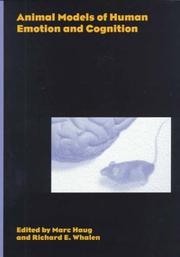
ISBN: 1557985839 Year: 1999 Publisher: [Place of publication not identified] American Psychological Association
Abstract | Keywords | Export | Availability | Bookmark
 Loading...
Loading...Choose an application
- Reference Manager
- EndNote
- RefWorks (Direct export to RefWorks)
Psychology, Comparative --- Human behavior --- Cognition --- Models, Psychological --- Emotions --- Models, Theoretical --- Psychology --- Behavior and Behavior Mechanisms --- Mental Processes --- Psychiatry and Psychology --- Psychological Phenomena and Processes --- Investigative Techniques --- Behavioral Sciences --- Behavioral Disciplines and Activities --- Analytical, Diagnostic and Therapeutic Techniques and Equipment --- Social Sciences --- Animal models --- Animal models.

ISBN: 0585087555 9780585087559 9780262275316 0262275317 9780262581677 0262581671 9780262082709 0262082705 0262581671 0262082705 Year: 1999 Publisher: [Place of publication not identified] MIT Press
Abstract | Keywords | Export | Availability | Bookmark
 Loading...
Loading...Choose an application
- Reference Manager
- EndNote
- RefWorks (Direct export to RefWorks)
Space perception --- Visual perception --- Visual Perception --- Space Perception --- Perception --- Mental Processes --- Psychological Phenomena and Processes --- Psychiatry and Psychology --- Psychology --- Social Sciences --- Psychologic Processes and Principles --- Human Information Processing --- Information Processing, Human --- Perceptions --- Perception, Space --- Perceptions, Space --- Space Perceptions --- Perception, Visual --- Perceptions, Visual --- Visual Perceptions --- Optics, Psychological --- Vision --- Spatial perception --- Psychological aspects --- Psychologic Processes --- Psychological Processes --- Phenomena, Psychological --- Processes, Psychologic --- Processes, Psychological --- Psychological Phenomenas --- Psychological Processe --- Sensation --- Spatial Learning --- Vision, Ocular --- Visual discrimination --- Spatial behavior --- Figure-ground perception --- Geographical perception --- Sensory Processing --- Processing, Sensory --- Visual Processing --- Processing, Visual --- #PBIB:1999.4 --- Space perception. --- Visual perception. --- Factors, Psychological --- Psychological Factors --- Psychological Side Effects --- Psychologists --- Psychosocial Factors --- Side Effects, Psychological --- Factor, Psychological --- Factor, Psychosocial --- Factors, Psychosocial --- Psychological Factor --- Psychological Side Effect --- Psychologist --- Psychosocial Factor --- Side Effect, Psychological --- Visual Perception. --- Space Perception. --- Perception. --- Mental Processes. --- Psychology.

ISBN: 0262270706 0585356521 9780585356525 0262032619 9780262270700 Year: 1999 Publisher: Cambridge, Mass. : MIT Press,
Abstract | Keywords | Export | Availability | Bookmark
 Loading...
Loading...Choose an application
- Reference Manager
- EndNote
- RefWorks (Direct export to RefWorks)
Visual perception. --- Short-term memory. --- Cognition. --- Visual Perception. --- Memory, Short-Term. --- Mental Processes. --- Perception visuelle. --- Mémoire immédiate. --- Visual perception --- Short-term memory --- Cognition --- Perception --- Memory --- Psychological Phenomena and Processes --- Psychiatry and Psychology --- Learning --- Visual Perception --- Memory, Short-Term --- Mental Processes --- Social Sciences --- Psychology --- Human Information Processing --- Information Processing, Human --- Memory, Shortterm --- Immediate Recall --- Memory, Immediate --- Working Memory --- Immediate Memories --- Immediate Memory --- Immediate Recalls --- Memories, Immediate --- Memories, Short-Term --- Memories, Shortterm --- Memory, Short Term --- Recall, Immediate --- Recalls, Immediate --- Short-Term Memories --- Short-Term Memory --- Shortterm Memories --- Shortterm Memory --- Working Memories --- Visual Processing --- Perception, Visual --- Processing, Visual --- Vision, Ocular --- Memory Training --- Phenomenography --- Training, Memory --- Memory Consolidation --- Education --- Psychologic Processes --- Psychologic Processes and Principles --- Psychological Processes --- Phenomena, Psychological --- Processes, Psychologic --- Processes, Psychological --- Psychological Phenomenas --- Psychological Processe --- Executive Function --- Sensory Processing --- Processing, Sensory --- Sensation --- Immediate memory --- Working memory --- Optics, Psychological --- Vision --- Visual discrimination --- Psychological aspects --- Psychological Phenomena --- Psychiatry --- Perception. --- Memory. --- Psychological Phenomena. --- Psychiatry. --- Learning.
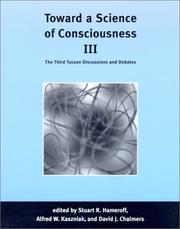
ISBN: 0262288028 0585375860 9780585375861 0262581817 9780262288026 Year: 1999 Publisher: Cambridge, Mass. : MIT Press,
Abstract | Keywords | Export | Availability | Bookmark
 Loading...
Loading...Choose an application
- Reference Manager
- EndNote
- RefWorks (Direct export to RefWorks)
"Can there be a science of consciousness? This issue has been the focus of three landmark conferences sponsored by the University of Arizona in Tucson. This volume presents a selection of invited papers from the third conference. It showcases recent progress in this maturing field by researchers from philosophy, neuroscience, cognitive psychology, phenomenology, and physics."--Jacket.
Consciousness --- Cognition --- Mental Processes --- Psychophysiology --- Psychological Phenomena and Processes --- Psychiatry and Psychology --- Social Sciences --- Psychology --- Cognitive Function --- Cognitions --- Cognitive Functions --- Function, Cognitive --- Functions, Cognitive --- Psychologic Processes --- Psychologic Processes and Principles --- Psychological Processes --- Phenomena, Psychological --- Processes, Psychologic --- Processes, Psychological --- Psychological Phenomenas --- Psychological Processe --- Consciousnesses --- Mind-Body Relationship (Physiology) --- Physiologic Psychology --- Physiological Psychology --- Psychology, Physiologic --- Mind-Body Relations (Physiology) --- Psychology, Physiological --- Mind Body Relations (Physiology) --- Mind Body Relationship (Physiology) --- Mind-Body Relation (Physiology) --- Mind-Body Relationships (Physiology) --- Physiologic Psychologies --- Psychologies, Physiologic --- Relation, Mind-Body (Physiology) --- Relations, Mind-Body (Physiology) --- Relationship, Mind-Body (Physiology) --- Relationships, Mind-Body (Physiology) --- Psychosomatic Medicine --- Mind-Body Relations, Metaphysical --- Human Information Processing --- Information Processing, Human --- Congresses --- Cognition. --- Consciousness.
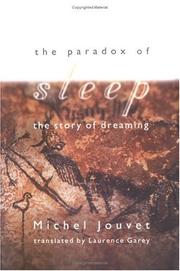
ISBN: 0262100800 0262600404 0262276518 0585078726 9780585078724 9780262100809 9780262600408 9780262276511 Year: 1999 Publisher: [Place of publication not identified] : MIT Press,
Abstract | Keywords | Export | Availability | Bookmark
 Loading...
Loading...Choose an application
- Reference Manager
- EndNote
- RefWorks (Direct export to RefWorks)
Dreams --- #PBIB:2001.3 --- Dreaming --- Subconsciousness --- Visions --- Sleep --- Psychophysiology --- Nervous System Physiological Processes --- Imagination --- Psychological Phenomena and Processes --- Cognition --- Nervous System Physiological Phenomena --- Psychiatry and Psychology --- Musculoskeletal and Neural Physiological Phenomena --- Mental Processes --- Phenomena and Processes --- Neuroscience --- Human Anatomy & Physiology --- Health & Biological Sciences --- Human Information Processing --- Information Processing, Human --- Musculoskeletal and Neural Physiological Concepts --- Musculoskeletal and Neural Physiological Phenomenon --- Musculoskeletal and Neural Physiology --- Nervous System Physiological Concepts --- Nervous System Physiological Phenomenon --- Nervous System Physiological Process --- Physiology, Nervous System --- Nervous System Physiologic Processes --- Nervous System Physiology --- System Physiology, Nervous --- Nervous System --- Cognitive Function --- Cognitions --- Cognitive Functions --- Function, Cognitive --- Functions, Cognitive --- Psychologic Processes and Principles --- Imaginations --- Mind-Body Relationship (Physiology) --- Physiologic Psychology --- Physiological Psychology --- Psychology, Physiologic --- Mind-Body Relations (Physiology) --- Psychology, Physiological --- Mind Body Relations (Physiology) --- Mind Body Relationship (Physiology) --- Mind-Body Relation (Physiology) --- Mind-Body Relationships (Physiology) --- Physiologic Psychologies --- Psychologies, Physiologic --- Relation, Mind-Body (Physiology) --- Relations, Mind-Body (Physiology) --- Relationship, Mind-Body (Physiology) --- Relationships, Mind-Body (Physiology) --- Sleep, Slow-Wave --- Sleep, Slow Wave --- Slow-Wave Sleep --- Nightmares --- Dream --- Nightmare --- Sleeping --- Slumber --- physiology --- Psychologic Processes --- Psychological Processes --- Phenomena, Psychological --- Processes, Psychologic --- Processes, Psychological --- Psychological Phenomenas --- Psychological Processe --- Psychosomatic Medicine --- Mind-Body Relations, Metaphysical --- Health --- Rest --- Sleep-wake cycle --- Hypnagogia --- Sleepiness --- Sleep Habits --- Sleeping Habit --- Sleeping Habits --- Habit, Sleep --- Habit, Sleeping --- Habits, Sleep --- Habits, Sleeping --- Sleep Habit --- Psychological Phenomena --- Psychology --- Dreams. --- Sleep. --- Psychophysiology. --- Nervous System Physiological Phenomena. --- Imagination. --- Psychological Phenomena. --- Cognition. --- Psychology. --- Musculoskeletal and Neural Physiological Phenomena. --- Mental Processes.
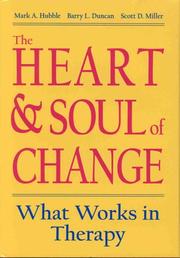
ISBN: 155798557X 9781557985576 Year: 1999 Publisher: [Place of publication not identified] American Psychological Association
Abstract | Keywords | Export | Availability | Bookmark
 Loading...
Loading...Choose an application
- Reference Manager
- EndNote
- RefWorks (Direct export to RefWorks)
Therapy is a profession under assault. Perhaps more than any time before, payers, consumer groups and legislators are putting what therapists do under the closest of scrutiny. Within the field itself, and especially among different theoretical schools, quarrels and contentious claims continue unabated. Various factions cast their model and their techniques as superior to the rest. Joining manualized therapy and protocol-driven interventions, so-called experimentally established therapies represent the latest campaign for a "technically correct" standard of care. One former president of the American Psychological Association was right: Therapy is being industrialized, as are virtually all who practice it. At the root of many controversies currently surrounding therapy is the important question of what works. Is efficiency based on the singular curative powers of specialized techniques or do other variables account for patient change? This book proposes the answer, which is not to be found in different languages, theories or procedural differences. Instead, the answer lies in common factors - the ingredients of effective therapy shared by all orientations. More than 40 years of outcome research is pointing the way to what really matters in the therapist's day-to-day work. The editors have assembled some of the best researchers and practitioners in the field today. Through their efforts, findings from multiple perspectives - clinical, research, quantitative and qualitative evidence, individual and family therapy, medical and school psychology, and, finally, a broad range of theoretical orientations - are bridged. The result is a book that provocatively interprets the empirical foundation of how people change in a scholarly yet accessible manner. Clinicians will especially appreciate the wealth of practical suggestions for employing the common factors in their daily practice.
#PBIB:2000.2 --- #KVHB:Psychotherapie --- #KVHB:Psychiatrie --- Strategic therapy --- Differential therapeutics --- Mental Disorders --- Treatment Outcome --- Decision Making --- Psychiatry --- Psychotherapy --- therapy --- methods --- Psychagogy --- Therapy (Psychotherapy) --- Differential therapeutics in psychiatry --- Mental illness --- Clinical sociology --- Mental health counseling --- Treatment --- Methodology --- Outcome Assessment (Health Care) --- Thinking --- Prognosis --- Behavioral Disciplines and Activities --- Behavioral Sciences --- Psychiatry and Psychology --- Medicine --- Diagnosis --- Outcome and Process Assessment (Health Care) --- Mental Processes --- Health Occupations --- Quality of Health Care --- Disciplines and Occupations --- Analytical, Diagnostic and Therapeutic Techniques and Equipment --- Psychological Phenomena and Processes --- Health Care Evaluation Mechanisms --- Health Services Administration --- Health Care Quality, Access, and Evaluation --- Health Care --- Health & Biological Sciences --- Mental Disorders - therapy --- Psychiatry - methods --- Psychiatry - Differential therapeutics --- Psychotherapy. --- Strategic therapy. --- Outcome Assessment, Health Care. --- Thinking. --- Prognosis. --- Behavioral Disciplines and Activities. --- Behavioral Sciences. --- Medicine. --- Diagnosis. --- Outcome and Process Assessment, Health Care. --- Mental Processes. --- Health Occupations. --- Mental Disorders. --- Treatment Outcome. --- Decision Making. --- Psychiatry. --- Quality of Health Care. --- Health Care Evaluation Mechanisms. --- Health Services Administration. --- Health Care Quality, Access, and Evaluation. --- Delivery of Health Care. --- Differential therapeutics.
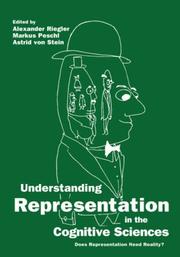
ISBN: 0306462869 9786611043674 1281043672 0585296057 Year: 1999 Publisher: New York, N.Y. Kluwer Academic
Abstract | Keywords | Export | Availability | Bookmark
 Loading...
Loading...Choose an application
- Reference Manager
- EndNote
- RefWorks (Direct export to RefWorks)
urrently a paradigm shift is occurring in for the conventional understanding of represen- which the traditional view of the brain as tions. The paper also summarizes the rationale for C representing the "things of the world" is the selection of contributions to this volume, which challenged in several respects. The present volume will roughly proceed from relatively "realist" c- is placed at the edge of this transition. Based on the ceptions of representation to more "constructivist" 1997 conference "New Trends in Cognitive Sci- interpretations. The final chapter of discussions, ence" in Vienna, Austria, it tries to collect and in- taped during and at the end of the conference, p- grate evidence from various disciplines such as p- vides the reader with the possibility to reflect upon losophy of science, neuroscience, computational the different approaches and thus contributes to b- approaches, psychology, semiotics, evolutionary ter and more integrative understanding of their biology, social psychology etc. , to foster a new thoughts and ideas. understanding of representation. The subjective experience of an outside world This book has a truly interdisciplinary character. It seems to suggest a mapping process where environ- is presented in a form that is readily accessible to mental entities are projected into our mind via some professionals and students alike across the cognitive kind of transmission. While a profound critique of sciences such as neuroscience, computer science, this idea is nearly as old as philosophy, it has gained philosophy, psychology, and sociology.
Cognitive psychology --- Mental representation --- Représentation mentale --- Cognitive science -- Congresses. --- Electronic books. -- local. --- Mental representation -- Congresses. --- Cognition --- Mental Processes --- Psychological Phenomena and Processes --- Psychiatry and Psychology --- Neurology --- Psychology --- Medicine --- Social Sciences --- Health & Biological Sciences --- Congresses --- Cognitive science --- Représentation mentale --- EPUB-LIV-FT SPRINGER-B --- Medicine. --- Philosophy. --- Epistemology. --- Phenomenology. --- Neurology. --- Artificial intelligence. --- Cognitive psychology. --- Medicine & Public Health. --- Cognitive Psychology. --- Philosophy, general. --- Artificial Intelligence (incl. Robotics). --- Consciousness. --- Philosophy (General). --- Genetic epistemology. --- Phenomenology . --- Artificial Intelligence. --- Neurology . --- AI (Artificial intelligence) --- Artificial thinking --- Electronic brains --- Intellectronics --- Intelligence, Artificial --- Intelligent machines --- Machine intelligence --- Thinking, Artificial --- Bionics --- Digital computer simulation --- Electronic data processing --- Logic machines --- Machine theory --- Self-organizing systems --- Simulation methods --- Fifth generation computers --- Neural computers --- Philosophy, Modern --- Epistemology --- Theory of knowledge --- Philosophy --- Mental philosophy --- Humanities --- Psychology, Cognitive --- Nervous system --- Neuropsychiatry --- Diseases --- Representation, Mental --- Abstraction --- Perception
| Listing 1 - 10 of 17 | << page >> |
Sort by
|

 Search
Search Feedback
Feedback About UniCat
About UniCat  Help
Help News
News